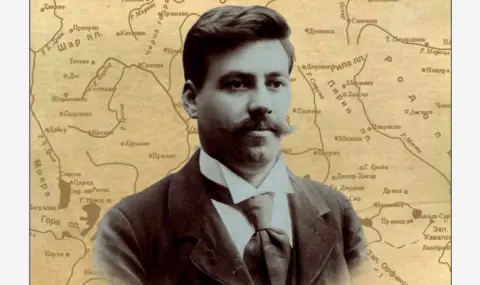On January 23 (February 4, new style), 1872, Gotse Delchev was born in Kukush. The city is located within the borders of the Ottoman Empire. Gotse Delchev was born into the family of Nikola and Sultana Delchevi. His brothers Milan, Dimitar and Hristo Delchevi were also members of the VMORO.
He graduated from junior high school in his hometown, after which he continued his education at the Thessaloniki Bulgarian Men's High School “St. St. Cyril and Methodius”. In 1891 he entered the Military School in Sofia, but due to his participation in a socialist circle he was expelled in 1894. was a teacher in Shtip, where Damyan Gruev, one of the founders of the Bulgarian Macedonian-Odrijan Revolutionary Committees, later renamed the Internal Macedonian-Odrijan Revolutionary Organization, also worked. Gotse Delchev was attracted to the organization by Dame Gruev and became its de facto leader. The main idea of VMORO was that the liberation of Macedonia and the Odrijan region was possible through a general armed uprising. The organization set the autonomy of Macedonia and the Odrijan region within the Ottoman Empire as its initial goal.
In 1895, Gotse Delchev left teaching and devoted himself entirely to revolutionary activity. He was one of the first organizers of the organization's border posts in Pirin Macedonia - Kocherinovo, Rila, Kyustendil, Dupnitsa, etc. and of the illegal channels to the interior of Macedonia. In 1896, he participated in the work of the Thessaloniki Congress of the VMORO and, together with Gjorche Petrov, he drafted the program and statute of the organization, which provided for its construction on democratic foundations. After the congress, Gotse Delchev was elected as a representative abroad, a mobile member of the Central Committee of the VMORO. He made great efforts to build the revolutionary network, as well as to supply the organization with weapons.
In 1899, on the initiative of Gotse Delchev, the construction of the VMORO Chetnik Institute was started, which played an extremely important role in its further massification and revolutionization. As the chief inspector of the chetniks, Gotse Delchev undertook several tours of Macedonia and Adrianople Thrace. In 1902, together with Gjorche Petrov, he participated in the drafting of the new program and statute of the organization. It now set itself the goal of attracting and uniting "all dissatisfied elements in Macedonia and Adrianople, regardless of nationality" and for the conquest of full political autonomy.
At that time, the name of the organization was the Secret Macedonian-Edrine Revolutionary Organization. Despite the successes achieved in its organizational development, G. Delchev was still not convinced that it was ready to proceed with an armed uprising, which is why he opposed the decision taken in his absence by the Thessaloniki Congress of 1903 to raise an uprising in Macedonia and the Edirne region in the spring of the same year. Together with Dame Gruev and other revolutionary figures, they managed to postpone the announcement of the uprising until the summer of 1903, as well as to transform it from a widespread one into a strategic one, i.e. to declare it mainly in the mountainous and semi-mountainous regions and to involve more armed detachments formed for this purpose.
In March 1903 Gotse Delchev's detachment blows up the bridge over the Angista River - on the Thessaloniki - Edirne railway line.
In early May 1903, on its way to a meeting with the leaders of the Serre Revolutionary District, Gotse Delchev's detachment found itself surrounded in the village of Banitsa, Serres. The detachment, commanded by Major Hussein Tefikov, who was a fellow graduate of Gotse Delchev, blocked the village on the night of May 3-4 after receiving a signal that partisans were spending the night there.
Gotse Delchev decided to lead the Chetniks out of the village, but the attempt was unsuccessful. After a day-long battle with the superior army, Gotse Delchev was killed. His death is perceived by contemporaries and historians as one of the heaviest losses for the VMORO.
After Tefikov forbade his men to tamper with the corpses of Delchev and his chetniks, their remains were briefly sent to Syar and identified by the local authorities, after which they were buried in a common grave in their birthplace, the village of Banitsa. The bones of Gotse Delchev were brought to Bulgaria during World War I by Mikhail Chakov and were kept in an urn in the Ilinden Organization until 1946.
After the September 9th Coup of 1944, Bulgaria changed its policy on the Macedonian issue and under pressure from the SFR Yugoslavia and direct pressure from the USSR, the Bulgarian Communist Party transferred the bones of Gotse Delchev to Skopje during the beginning of the cultural autonomy of Pirin Macedonia.
After 1948, Bulgaria gradually began to return to its old thesis that Macedonians are Bulgarians, but it was already too late, since in Yugoslavia historiography already accepted Gotse Delchev as a Macedonian national hero.
